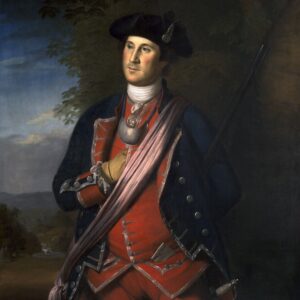There’s no escaping it. Campaign ’24 is in full swing, and before long, your TV and computer screens will be dominated by commercials asking for your vote. That’s how politicians win elections these days. All that advertising is expensive, and a candidate better be prepared to shell out serious bucks if he’s serious about winning.
Nearly 268 years ago, a young candidate learned the hard way that going cheap doesn’t pay when seeking public office.
Long before he became the Father of Our Country, George Washington was burning with ambition. He had a lot going for him. Just 23, tall, strapping and handsome, he was fresh from service in the French and Indian War, where he had made headlines on both sides of the Atlantic. Clearly, young George was going places.
In December 1755, he threw his tricorn hat into the ring and announced his candidacy for a seat in the House of Burgesses. It was Colonial Virginia’s state legislature. As the New World’s first democratically elected legislative body, it was highly influential in shaping the way we Americans govern ourselves.
George figured his celebrity status would be enough to carry him to victory. And George figured wrong.
In Colonial times, voters had certain expectations of their political candidates. Office-seekers were unofficially required to spend Election Day warmly pumping every hand in sight and offering voters all the free alcohol they could drink.
George had a reserved personality. Glad-handing didn’t come easy to him. Being a young man who wasn’t rolling in dough, he also scrimped on the free hootch, too.
It was a big mistake.
People resented not wetting their whistle at the candidate’s expense. When the votes were counted, the man who would eventually be described as “first in the hearts of his countrymen” came in second.
It was a bitter blow. But you can say this much for Washington: He learned from his mistakes. Because, when the next election rolled around in 1758, George was ready to seriously party with voters.
This time, he dug deep into his pockets and let the booze flow like the Mississippi River at flood stage. He sprang for gallons of rum, the Colonists’ very favorite drink. People were so crazy about it in the years before the Revolution; it’s estimated every man, woman and (incredible as this now sounds) even some children drank 3.7 gallons of the sweet spirit every year.
But George didn’t stop there. He provided a form of joy juice for almost every electoral taste. Rum punch, beer, wine, hard apple cider … if you could get sloshed on it, George had it. In all, a staggering 160 gallons of alcoholic drinks.
That was a half gallon for each vote Washington received. Those thirsty Virginians drank every last drop, too.
And it worked. George finally found out what the winning side of election night felt like.
Washington served seven years in the House of Burgesses, and then … well, you know the rest of the story. Yet the lesson he learned the hard way was lost on another prominent Revolutionary-era candidate.
In 1777, 26-year-old James Madison also sought a seat in Virginia’s legislature. Although brilliant, “Little Jemmy” was also painfully shy with limited cash on hand. So there was little handshaking and even less hard stuff for voters. Madison bitterly attributed his defeat to a lack of “the corrupting influence of spirituous liquors and other treats.”
Getting back to George, the career that culminated in pioneering the U.S. presidency was launched on a wave of free alcohol.
A parting note to any political candidates who may be reading this: What worked for Washington in 1758 won’t help your chances for victory in 2024. Bad things happen today to politicians who give drinks in exchange for votes. Save the spirituous fermenti for election night to either toast your win or drown your sorrow.

